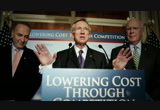tv Charlie Rose PBS March 5, 2013 12:00pm-1:00pm PST
12:01 pm
>> rose: on march 1, america watched as president obama signed the sqes interlaw. democrats and republicans have failed once more to reach a deal on fiscal policy, sweeping cuts are already beginning to take effect. the conversation about how to address the size of the receive it is and the level of debt has been divisive and heated. joining me now are two people from both sides of the political spectrum, paul krugman is a nobel prize winning economist who has argued for stimulus in his latest book "end this depression now." joe scarborough is the host of msnbc's "morning joe" and was a republican member of congress from 1995 to 2001. he has warned of a coming collapse without cuts. the two of them started a debate on debt over a month ago on "morning joe" and here's a look at how the conversation began. >> if the problem is we are worried about health costs in the year 2025, why exactly is it urgent that we do something now?
12:02 pm
because we're not talking at this point about paying down debt. >> are you saying we don't need to -- >> we need to work on projects. >> and i'm talking specifically about the main drivers of the debt. medicare, medicaid. >> well, the math clearly doesn't add up, would you agree? >> we know something's going to happen. >> but why wouldn't -- >> it's not something that's going to hit right away. what we need to do on health care costs is we need to find ways to deliver health care more cheaply. we need to find ways of controlling those costs. we can do that through a lot of things that are already in the affordable care act. we have have pilot projects on different ways of paying health care. we can have attempts to establish more accountability in medical practice. we can try to have research into what health care treatments actually work, which we have no surprising -- >> but you and i both know that washington, d.c. is not capable
12:03 pm
of doing that on a microlevel. >> i don't know that that's true. >> we saw it in '93/'94, we saw in the 2009/2010. >> i think we are making substantial progress. >> is that not the perfect being the enemy of the good? >> no. >> we know this storm is coming in medicare and medicaid, we do know that, right? >> no, we think it. >> rose: i'm pleased jeff so joe scarborough and paul krugman back on this program. let me ask you this question: what do you disagree about? what's the heart of this disagreement and how do you see what he says and what you say? >> let me say, first of all, after we had that conversation i had a lot of people saying "you guys were saying almost exactly the same thing." i took great offense to that, as i'm sure paul would take great offense to that. maybe it's just a change of emphasis maybe he's more focused on the short term and i'm more focused on the long term. but i think paul said on the
12:04 pm
show and he believes it, congress can't do two things at once. it can't grow the economy now and focus on the long term. i would say i was influenced by paul krugman and who what he wrote back in the 1990s, what he wrote in materially 2000 united statess. in the 1990s, i've got to say, you would have been a member of newt's anti-debt party. >> no. >> in the 1990s you look at your books, your writings and you said it was startingly irresponsible for the federal government to run deficits because you talked about this coming army of baby boomers and you've said it was going to hit in 2012 and that's when we needed to be ready. >> but the point is it was irresponsible to be running deficits when the economy was at full employment. and it didn't need the support from the federal government. we mised that window. we didn't do it. we didn't pay down the debt when the economy was fairly strong. now we're in a situation where trying to -- obsessing about debt right now at a time when the economy is very weak,
12:05 pm
whenever dollar you cut from federal spending is probably going to take a dollar and a half out of g.d.p., it's probably going to lead to substantial increase in unemployment. that's a -- now is exactly not the time to do that. we do have a longer term problem. we should have used -- it would only help a little bit but we should have used the '90s. we should have used the bush years to pay down debt so we would have come into the era of baby boomers retiring with little debt. we didn't do that and that's not the choice right now. >> rose: what's changed since 1997 -- >> the worst economic crisis in three generations! >> but what has not changed is the fact that baby boomers, as you predicted, they would be moving towards retirement, in 1997, in the age of diminished expectations you said specifically "why worry about deficits in? there's a huge army on the march baby boomers are getting older, the enormous generation is going to be turning 65 in 2010, their ranks will swell, the aging population will create huge foreseeable budget problems."
12:06 pm
you predicted that in '97. >> everybody knew that was coming but that was a reason to pay down debt back then. now the urgent problem is the highest long-term unemployment since the 1930s, right? a deeply depressed economy, in this economy -- >> but in this problem that you predicted that you saw coming is still with us, is it not? >> but the opportunity to pay down some debt in advance, we missed that, we blew that largely because george bush decided to sqaunder the clinton surpluses at a time we didn't need to run budget deficits. now we need to run budget deficits and the difficulty we're having is that two and a half years ago the conversation in washington turned away from creating jobs to deficit issues as if the deficit-- which is a problem for ten years, 15 years, 20 years out-- as if this were the crucial issue we needed to deal with now and it is not. so i've also learned a few things in the last 15 years. so using things i said in 1997
12:07 pm
is not the best try analyze my views now. but the main thing is -- >> but this is what you said in 2005 "medicare and medicaid are going to increase the deficit in 2010, the deficit might well exceed 8% of g.d.p. sometime in the next decade. that's a deficit that will make argentina look like a model of responsibility." >> well, i've learned a few things since then, too. >> rose: since 2005? >> yes. >> rose: so you've been wrong for 15 years? >> oh, you want to go that way. why don't we argue the substance instead of playing gotcha. the substance is -- >> i'm looking at your words. >> no, substance, not goch chashgs substance. congressional budget office has a projection that the u.s. debt to g.d.p. ratio is going to be flat for the next ten years. congressional budget office sees no problem looking ahead ten years. >> rose: flat is what? 75%? >> 75%. we'd like it to be lower -- i'm talking debt level, debt stable as share of g.d.p. >> 75%. >> that says no debt crisis for
12:08 pm
the next decade. now there is a big problems which mostly health care costs when we look at the decade ahead. but what has happened in washington, what has happened in this debate is that the prospect of -- somehow or other the current deficit has become issue number one and the result is that we have not only been doing nothing to fight unemployment we've been actively increasing unemployment. >> who is -- who has the deficit is issue number one. >> everybody! >> i don't think even paul ryan has the deficit as issue number one. i don't think erskine bowles has it. we're talking about long-term debt. >> erskine bowles told us two years ago we were going to have a fiscal crisis within the next two years. right now unless we have a -- unless we adopt bowles-simpson we'll have a fiscal crisis within the next two years. that was two years ago. they didn't say -- come on, if you look at the discussion right now it's overwhelmingly a discussion which n which people are talking -- we're going to be
12:09 pm
greece any day now. >> if i don't know who's saying that. >> my god, who's -- everyone! >> is erskine bowles saying we're going to be greece right now? >> erskine bowles said we'll have a major fiscal crisis within just two years and he said that two years ago. >> rose: if the debt-to-g.d.p. ratio jumped to 85%, would it change your attitude? if it got worse and worse and worse what point would you say i agree with joe, we have to do something about the deficit now:. >> well, it has to be -- i don't know where the line is but we know it's way above here. we know that advanced count these have their own currencies, that borrow in their own currencys have -- japan has 200% and no problem. the united states had well over 100% after world war ii, no problem. britain had over 100% for most of the 20th century, no problem. so the notion that we are anywhere close to a trigger point is history says that's just not true. >> and going back to your first
12:10 pm
question where do we divide? where -- what was it about that interview that perked my ears up? well, for richard haass it was when you said we don't to worry about deficits for the next ten years. i think that's debatable. but for me it was when paul said we don't to worry about medicare until 2025. >> that's not what i said. >> or whatever the problem -- >> we have a problem here. >> and also said that the debt was maybe the five, six on his radar. >> the debt even, the debt doesn't worry me. i do worry and it's kind of a deficit problem, i worry that right now we are expecting things from our government looking ahead 15 years that at the same time we are not given the current political environment willing to pay for. >> right. >> so there is a gap between what we want and the amount of revenue we're willing to collect which will be a deficit problem if it works out that way. now, something has to give ten, 15 years from now and of course we need to deal with that and better if we don't wait until the year 2025 is upon us.
12:11 pm
but in the midst, again, of the worst economic crisis since the great depression, is the prospect that we're going to have a gap between expenditures and revenues ten 15 years from now, is that something that deserves to be high on our agenda as opposed to creating jobs? >> you know the situation, too -- and first of all i can agree with paul about the importance of growth. i think jack kemp on the other side would agree as well. but from '95 and '96 and '97 when paul was writing what he was writing about deficits and i think for the most part was deficit hawk we were going out and we would fight on the floor but have an amendment on the floor, we're going to slash a million dollars from this wasteful program and 200 million from that. then in '96, '97, '98 when the economy was growing, i said to my colleagues did we just waste three years? because when all of that revenue started poring in and the economy was growing the way it did, 21 million new jobs created
12:12 pm
in the 1990, it was almost like this tidal wave of cash flooded in and suddenly these deficits that we've been so concerned about, they did go away. so the question is how do you do that? jack kemp said you would do it one way, paul krugman said do it another way. that's why i say i'm not so concerned about short-term deficits because the long run projections are so different. >> if you're not concerned about short run deficits -- >> if the economy grows at -- >> why are we fighting about 3%? we're having a debate about how much spending to cut right now. if you're not worried about short-run deficits you're totally out of step with everybody in your party, in fact with most of washington which is totally upset with short-term deficits. >> i think straw man has been set up by many on the the left-- i'm not accusing you of doing this-- but talking about how republicans want european style austerity. there are members that that come on the show that make me want to
12:13 pm
go into my office and bang my head against the wall because they don't want to deal with democrats. but i think there is a deal to be done. we need to grow the economy now but the big concern for most republicans i talk to is medicare, medicaid, social security to a lesser degree but taking care of long-term entitlements. even that becomes easier if you can grow the economy in the short run. the question is how do you grow the economy in the short run? >> rose: in terms of the short-term, paul doesn't think we have a spending problem. >> right. >> rose: you think we have a spending problem in the short term? >> right now? this year? next year? i don't think over the next three, four, five years it's going to cause a serious problem. i think if you look again at president projections, look at the projections of what we do for from medicare, medicaid, we need to plan for that and that's where we disagree as well. >> let me ask a question: would you support an extra $200
12:14 pm
billion a year in spending on infrastructure and education right now? >> oh, yeah, i talk about it all the time. >> then you're -- >> i go around -- i talk to republicans all the time. ike, 1957, put nick goes up, what does dwight eisenhower do? he invests in a program to put our own satellite up in space. but he also invests in science. in creating a new generation of scientists, engineers, mathematicians. that allows -- >> rose: that's the kind of discretionary spending you'd like too see. >> that allows j.f.k. several years later to say "we're going to send a man to the moon by the end of the decade" and we do that and what happens? again, this is how i'm saying -- i've been saying it all the time. we're talking about 10%, 11%, the 12-% of the budget when we're talking about discretionary spending. that's short-sighted. you invest a n that, send a man to the moon but the most important thing j.f.k. said when he talked about sending a man to the moon by the end of the
12:15 pm
decade was creating a new generation of engineers and scientists and mathematicians. that night when neil armstrong walked on the moon the average age of the engineer in mission control was 28! and what aid that did for our economy over the next 30 years is incalculable. >> rose: in that case you're -- >> president obama proposed the american jobs act in 2011, right? this which called for a modest amount of infrastructure spending so more aid to the state so they could rehire schoolteachers. it got nowhere. so if there's a straw man, if you're saying it's a straw man. gosh, that strong man seems to control a working majority in the house of representatives. it went nowhere. if we could have -- i mean, i'd be delighted to have eisenhower policies. i'd even take the top tax rate of 91%. >> i'm sure you would. >> but i would take the interstate highway system or its equivalent. >> and there's a great example where you make an investment that's losting. my great concern about the
12:16 pm
stimulus package-- i know, paul, you thought it should have been large herb-- i thought it should have been more focused. jeffrey sacks and i said that it was so unfocused that we couldn't find a member that voted on it. it was a largest spending bill in u.s. history that read the bill before they passed it. >> that's terrible legislation anyway. >> but you don't want that to be true of the biggest spending bill in u.s. history when so much is on the line. but, no, i've said it every single day if you watch the show i talk about we need investing in education and infrastructure. >> but that means spending more money right now. >> right! that's where i said on the show i'm not concerned about deficits. i'm concerned about long-term debt. >> i'm not concerned about long-term debt. i'm concerned about the long-term imbalance between what we want and what we're prepared to collect in revenue which is not quite the same thing. it has very little to do with deficits now or the level of debt ten years from now.
12:17 pm
>> but if you go back to '97 and read your book, the numbers that you gave -- this illustrates a problem. they were so much closer together. you were concerned about that. now they've separated, americans have decided they like how republicans tax and they like how democrats spend. >> so what's the goal for now? 16% g.d.p. in tax receipts? >> no, that's a depressed economy. >> rose: part of this argument, too, is that you have said there's an argument, this thing called amplification. you believe when joe suggests that most of the people he knows believe that the debt is a big problem that he's talking within a circle of people that do not represent what? >> that certainly are not a -- the kind of unanimous -- joe said first nobody agrees with me then maybe three or four people agree with me and the fact of the matter is that -- >> i think paul krugman versus the world, i meant it as a compliment. >> yeah, but when you put -- >> i really did mean it as a compliment! i sat there and i was like wow.
12:18 pm
>> i said we don't have a problem this year or next year or in fact -- >> rose: but why should we wait is my question when i hear you say that that? >> there was an interesting experiment. larry summers essentially agrees with me on this stuff. >> rose: well, i've read larry and he was on this program last week so, i mean it's not totally agreement with you. he does believe you ought to pay attention to debt and he says you can't obsess over it. that's what he said. >> he's in favor of more spending now and he's a very strong believer in something that i kind of believe -- >> spending on things like infrastructures. >> he wants more spending now -- >> rose: but it's on infrastructure. >> but let me give you my example. larry summers -- short-term deficits and long-term debt. >> larry wrote a piece for the "financial times" that was a very strong piece on why we should not be cutting spending now, in fact we should be spending more. but it began with three paragraphs of boilerplate about
12:19 pm
the importance of being concerned about long-term debt. standard stuff. and what happened was-- and i watched the reactions of the "washington post" editorial page i watched the way it was quoted on the t.v. shows-- everybody read those three paragraphs and stopped and read him saying that we must cut spending. >> rose: i just told you that he in fact said the deficit was an issue but he thought that you could obsess over it too much and that he does believe in a still throws the economy in terms of -- >> but it did not get through. what happened was that by trying to walk and chew gum at the same time what he ended up doing was the people ended up chewing gum and not walking because people in fact -- the discussion in our political -- the discussion inside the beltway, the discussion inside europe has been all deficits, almost nothing about the harmful effects of spending cuts, almost nothing about the need to create more jobs we just had to experiment, can you do this at the same time and everyone who's tried to do the mixed message if
12:20 pm
you like -- the nuanced message has failed to get it across and if it wasn't for me and a few people saying the deficit isn't a problem without first qualifying of three paragraphs saying longer term it is a problem i don't think the message that spending cuts are hurting the economy -- >> paul, it's very important to note paul agreed that only three people agree with him. >> rose: (laughs) >> no, no, only three people are saying it without pref sasing with the obligatory three paragraphs. ben bernanke gave a speech last week that was for all practical purposes saying the same thing i'm saying. he said the debt outlook looks relatively okay through the -- for the next ten years, not we would like to be lower but it's relatively okay and then spending cuts are a bad thing and it was essentially indistinguishable on the substance. not a style. i have a different style but the substance is no different at all. >> the problem, though, with not
12:21 pm
focusing on the long term debt now is it is a generational problem and i'm not playing goch that cha but going back to what paul wrote and has been writing for 15 years up until the crash you've got to plan ahead. it's unconscionable not to plan ahead. for my four-year-old child, for my nine-year-old child. are because at some point we're going to have to tell beneficiaries whether you cut it off at 50 or earlier, v 5 or earlier. we have to say the rules of the game are going to change for medicare recipients at some point. i don't think we can wait-- and you didn't say wait until 2025-- but i don't think we could wait another decade before we started a dressing medicare. i don't think that's this incestuous group thing. >> rose: go ahead. >> but it's an enormous difference -- the way the rhetoric -- you're saying you don't they but certainly the way that -- well, richard haas on the program saying bad things
12:22 pm
are going to happen very soon -- >> rose: on the national security front if we don't get our fiscal house in order. lots of people say-- the president included in his speech at west point-- >> yeah, well, that was unfortunate. >> what's unfortunate? >> richard -- just to set this up, richard was taken aback by the fact you told richard we didn't have to cut for ten years. that was shocking. >> that's still true. >> so you don't think we have to make any cuts over the next decade? >> i don't think we have to. if the economy recovers we could do some cutting but we don't have to for the next decade. we will eventually have to deal with health care costs, we have to deal with the cost of the programs we want but there is no urgency and no urgency means not this year, not in the next five years and arguably not in the next ten years. and that's more or less when what ben bernanke said. >> rose: well, alan blinder says some of that, too. >> that's right. alan put out this thing which he said in the atlantic how to
12:23 pm
worry about the deficit. one, don't. two, wait a few years. three, worry about health care costs. >> i'm totally on board with that. but what alan also said was that the situation was going to be so bad that we were going to have to address it and not the next year, not the next two years or three years but he said the situation was going to be so bad that democrats were wrong, they weren't going to be able to tax their way out of it, that this was going to be a huge crisis certainly ten years out. >> it's democrats we ear talking about. certainly not the president. the president has always been offering a mixture of entitlement cuts and revenue increases. so more revenue -- >> rose: what entitlement cuts has s the president recommending? >> well, at the moment -- first of all you have to bear in mind that there is is substantial cuts in outyear medicare expenditures already. >> rose: because of health care reform. >> right. then he's been offering chain linked c.p.i. on social security which is technical impossible
12:24 pm
but is a benefit cut. he has floated and withdrawn raising the medical medicare age but it's a terrible idea. >> rose: terrible idea? >> terrible idea. >> rose: the president is now against it. >> i'm glad to see him back down. and he suggested that he's willing to do more stuff. >> rose: i want to come back to this two quick questions. he has said that the washington, d.c. cannot deal with short term fiscal issues and growth and cutting the deficit at the same time. is he right in that? >> no! >> that's the basic difference. >> well, here's the problem. washington can't do either! if you look at the sequester and see how that happened, that train wreck -- >> rose: does it have to be either or as far as joe scarborough is concerned? >> no, it doesn't have to be either or. i'm not going to look at the reaction larry summers got from an op-ed and make my decision based on that.
12:25 pm
what i'm saying to washington politicians is you have no choice. you have got to grow the economy now. you also have to start planning ahead for what's coming in 2020. >> rose: but, joe, when you say that, if you've got to grow the economy now, do you have to say to yourself, too, we cannot deal with the deficit in the next several years until we grow the economy to a level that unemployment comes down? >> you're talking about the deficit. i'm talking about the debt. i'm talking about long-term debt. i'm talking about entitlements. i just don't know many people other than paul that are saying we can wait another ten, 15 years. >> rose: and you say we cannot wait ten years because this will happen? go ahead. >> well, you've got again. the you have 10,000 baby boomers retiring everyday. you can look at the projections for cost of medicare and medicaid in particular. >> congressional budget office says debt is stable for the next
12:26 pm
ten years. >> as a percentage -- >> now you can say with the desirable do something the next ten yearss about what will happen later on. but where is your demonstration that we have to dealle with this where as s this coming from? and bowles and simpson said -- i mean, i like this because they were honest men. they gave us a date. they said two years we'll have a fiscal crisis unless we deal with this. that was two years ago. >> you've made projections yourself that have been wrong in the past. >> but that's the point. we want something -- if you want to tell me this is urgent, tell me what is going to happen if we don't deal with this right now? why is it that five years from now according to the c.b.o. debt being a little bit lower relative to g.d.p. than it is right now something else will happen if we don't address those long-term issues.
12:27 pm
>> the thing is, though, we don't know. as bob ruben says, you never know when a bond crisis is going to come. it's not like we're going to get a warning. you're going to wake up one day and suddenly there's going to be a crisis. when is that going to happen? i don't know. >> all kinds of things can happen, right? >> what do you mean all kinds of things? again, paul, you've been predict this for 20 years. >> that's such a tired argument. search for quotes and stuff i said once upon a time -- >> instead of dealing with the issue. >> you said this for 15 years! then you woke up one day and said i was wrong. >> no. >> you said we needed to create a housing bubble to replace the nasdaq bubble. >> come on, you know that i was joking when i said that. >> you were joking? >> yes >> yes, of course. >> so disappointing. so disappointing. if all you can do is ad hominem and say you said this -- >> well, anybody that knows me knows i don't engage in ad hominem anymore attacks. >> that's what you did right now. >> i'm quoting back what you
12:28 pm
say. >> we're trying to have a discussion right here. what is it in the next ten years that is going to force us to do something? >> we don't know. as richard haas said you're right until the day you're wrong and the day you're wrong that's a very bad day, indeed. what do you want me to do? to tell you that the markets are going to turn on us on january 27? >> no, i want you to tell me why the markets would turn on us at all system? this is a -- there is a record here. there's a report of the last few years which is that the deficit hawks have been predicting imminent disaster again and again. they told us the interest rates were going to soar in 2009 and 2010 they told us inflation was going to rise. they said we're going to turn into greece and they keep on being wrong whereas people who have this analytical framework -- and i'm not just making numbers up, i'm taking a macroeconomic analysis and saying in a depressed economy deficits are not a problem. that framework has led to the
12:29 pm
correct problem as long as the conclusion in inflation will stay low as long as the economy is depressed. countries that borrow in their own currency are not like greece and every country that borrow in its own currency including japan with its 200% debt-to-g.d.p. ratio have lower interest rates. now you're telling me, yes, but something could happen even though the numbers say nothing should happen for the next ten years, that something terrible -- and i should be afraid of that phantom. >> afraid of the phantom. it's not an ad hominem attack. you use the words that erskine bowles and alan simpson say. it's not ad hominem, look at what you said for the past 15 years. >> that's very disappointing. >> it's disappointing to you because you act as if these people that have been warning about the deficit and the debt have been wrong for decades. >> no, they've been wrong in this crisis. a crisis is a very different -- >> over the past two, three,
12:30 pm
four years you've changed your tune and that's fine. >> because the world changed. >> the world can change again. we had a nasdaq bubble, it blew up. that world change. we had a housing bubble, it. >> i've talked about this, we entered an alice through the looking glass world where virtue is vice and prudence is folly. i wrote that. i'm not sure people got it. times like this are very, very different. give me an a strong economy, give me a situation that looks something like the 1990s and i'll become a deficit hawk. not a hysterical deficit hawk but a deficit hawk. >> rose: you will become a deficit hawk when we have a strong economy. define for you a strong economy. is that g.d.p. growth of 4%? >> it's not growth. unemployment rate low enough that the fed is interesting rates to head off inflation. as soon as we're out of the
12:31 pm
liquidity trap where the fed has got its pedal to the metal. >> rose: so when the fed raises the interest rates to avoid inflation that's when the economy is good shape? >> no, that's when you can make a deal. the fed will hold off on the interest rate hikes. that way it doesn't depress the economy. >> you would start dealing with the debt immediately. you would go in and fix entitlement reform. yes? what would you do immediately to the debt? >> you want to get the parties talking. you want to get the white house, you want to get congress talking and talk about what's going to have to be done to address medicare, to address medicaid, to address social security which is less of a problem. and my belief is -- my concern about the crisis-- like bob rubin said, you never know when the bond crisis is going to hit-- my concern is that if we ignore all of these problems and
12:32 pm
push them off for ten years we increase the likelihood of those crises. i've said repeatedly on my show as well if we send the message that we're willing to do the responsible thing, so we're willing to make the tough choices, we're willing to ask americans to sacrifice in the long run to keep the entitlement program solvent i think that have sends a strong message to the world markets and i think that delays any possible crises. >> i'm not worried about the market. i think i've said that repeatedly. there is an issue but look at the parties. the parties are talking. they're talking at each other and that's because they have very, very different views about what kind of society we're going to have. remember the republican strategy for 30 years has been -- >> rose: you think conflict in washington is over what kind of -- >> what kind of society we should have. fundamentally -- >> rose: the role of government? >> the role of government. if you have one party that fundamentally wants to dismantle a lot of -- wants to end
12:33 pm
medicare as we know it, sharply cut medicaid, another party that doesn't want to do that, even if they could somehow reach a bargain it wouldn't stick. because after the next election there there would be an attempt to roll it back. we are not ready to deal with this. we have not had our eisenhower moment when there was in fact a broad agreement between the parties about who we were going to be. >> we've had this problem. like paul just talked about, it's what happened in washington. it happened in washington when you had reagan and tip o'neill working. it's what happened in the 1990s. >> rose: what was the difference then? >> everybody talks about how terrible barack obama's being treated. we treated bill clinton much worse. i remember coming to washington speaking of erskine bowles-- and telling erskine -- i was trying to politely figure out a way to tell erskine that i couldn't stand his boss. he was chief of staff and i said "the guy drives me crazy. i see him on t.v. and he goes i
12:34 pm
feel your pain. i know he's lying, erskine, i can't stand the guy." and he said don't worry, congressman, he hates you, too! despite the fact republicans couldn't stand the republicans, republicans couldn't stand the president, we balanced if the budget first time in a generation. four years since the 1920s with not a single republican vote and then we had a wonderful economic boom which wiz not the result of policy. which was the result of a technology boom but also -- >> if i can continue. he passed welfare reform. we actually took care of medicare, that was medicare crisis, we took care of it, bill clinton demagogued it you had democrats making tough choices. washington worked. i can't figure out why they can't -- >> here's one idea. other people said this was --
12:35 pm
the tom friedman said "the president has to lead with his chin and put a package on the table encomings three areas, new investments that combine immediate jobs and infrastructure with long-term growth in neighborhoods like massive jobs and other things that build out. and high speed broad band capabilities, two, long-term fiscal restructuring that slows the growth of social security and medicare entitlements along with individual and corporate tax reform. number three, a trajectory to shrink our relationship of debt to g.d.p. over time. shouldn't we expect the president to lay out that kind of plan so that it might force the republicans to respond and deal with these issues rather than taking the position that if i do that they'll take advantage of me? >> to a large extent he has been there. >> rose: if he had done that --
12:36 pm
let me tell you how he would do it. he would have a massive press conference at night to say this is what i'm doing and most people don't have the perception that he's done that, paul. they don't. >> i think that's because people don't want to have that perception. >> rose: let me interrupt you. that's not the impression that, for example, and they matter, john boehner doesn't have that impression. >> not just john boehner! democratic senators. charlie, they've talked to you, they've talked to me. democratic senators say the guy never reaches out to them he's done 18 campaign style events since they got -- >> no. >> but is the president's crisis big enough so that we need to have everything on the table that the president shouldn't do that? lay out his plan, he occupy it is bully pulpit, he the president in the executive branch rather than 535 members of congress? >> it understand where he's coming from and i think he's right. >> rose: where is he coming from? >> if he lists something -- and
12:37 pm
he has done. if you look at not the most recent but look at the budget he released last year. it called for a mixture of substantial spending cut -- >> rose: in what part of the budget? >> there were substantial cuts in medicare. actually, large cuts in medicare. >> in terms of the budget or in terms of health care reform? >> no, there were tactually further cuts in met care in the budget so there were substantial medicare cuts in there. there was a lot of new revenue in the plan as well and it would have set the debt-to-g.d.p. ratio. it wouldn't have fixed it forever but it would have led too a lower debt-to-g.d.p. ratio than we're looking at ten years from now. >> rose: what are we looking at ten years from now? >> about 75, so it would have been lower. >> rose: if everything works and it stabilizes. >> right. >> rose: if, if, if. >> the c.b.o. could be wrong in both directions. so you've got -- they're serious
12:38 pm
here. but the point is that went nowhere. it was not received. all that happened was that the spending cuts were taken as a starting point for demanding more spending cuts while the revenue increases were -- the republicans rejected those out of hand >> p why should he lay out that leadership -- >> rose: i understand that's leadership. >> no but -- he mixed the star trek and star wars talking about the mind meld but the fact of the matter is that we have republicans demanding large cuts without being willing to specify the cuts saying you, mr. president, go out there and propose these unpopular cuts. how can he operate under those sdmns. >> rose: well, i don't know, but how did eisenhower on late? >> in a totally different environment. i look at my friends in political science who measure polarization and our political system is more molarized now than pretty much ever.
12:39 pm
it's more polarized than it was on the eve of the civil war. so the idea that we can somehow through the president's personality recreate a political era when the parties were not very far apart on the fundamentals is not true anymore. >> rose: >> what do we do? do we just throw up our arms? you say it's this shh moozing if he talks to senators but we have to govern in between the election sfrplts that's why it becomes so important that we don't have a debt crisis right now. that's why we can deal with the problems we have-- which is mass unemployment-- we can try to deal with. that we can avoid being crazy on the budget but we can try to not obsess about the debt right now and just this country has to decide which future it wants. whether it wants to dismantle the new deal or whether it wants to stabilize that system with enough revenue and enough -- >> rose: that's an interesting
12:40 pm
question. >> if you look over the past 20 years the country has decided it wants plit government. >> that's not how it voted last year. >> rose: what is the kind of entitlement reform that you would applaud and not consider dismantling the new deal? >> oh, i would say very much health care spending we need an ability to say no. and not in no you can't have medicare but no we won't pay for this treatment. >> rose: so the problem for health care is the cost of health care and the value of health care? >> that's right. and we can do a lot there. >> rose: will that bring down the deficit? >> our health care costs are so much higher than they should be that if you combine effective further cost control in medicare with some additional revenue we can actually bring this thing under control. >> rose: paul, you probably agree with the president if he doesn't believe we have a
12:41 pm
spending problem because you don't believe we have a spending problem. you believe we need $300 billion right now in the economy? >> right now looking over the past -- >> rose: in order to create growth. >> looking over the past five years we don't have a spending problem. if we have a spending problem it's that we've been spending too it will until the last five years. if you ask do we have a problem about the cost of medicare in the decade ahead, not this coming decade but the next, we do. but that's a different point. >> let's look at the decade in the past between george w. bush and barack obama. we started when bush was president, we had $155 billion surplus. when he left we had a trillion dollar deficit. the national debt doubled from 5.6 trillion to about $11.5 trillion. it's now up to $16.5 trillion. we've added $11 trillion in debt to our balance book over the past decade. that's a problem. >> but that's not a spending problem, joe. that's a collapse of revenue problem.
12:42 pm
>> no, it's not a collapse of revenue program. you look through the bush years. it's not a collapse of revenue. >> it seems to me that bush did some major tax cuts early on, right? >> the biggest problem we had tax cuts, we had two wars, we spent domestically >> we spent on foreign policy. spending has gone up since 2008 we do have a spending problem. you can always say well, but the deficit is coming down, it would be like me going to the doctor and seeing my chest vol 400 and dragging "it's down 25%" >> if you look, spending is right now -- spending has come down fast. spending rose sharply because we had the worst economic crisis since the '30s. so we're spending a lot more on unemployment insurance, things like that. and because we had for a little while inadequate stinl us will but if you look at where we are right now spending isn't that
12:43 pm
much higher than it would be if we had continued on a sustainable path of growth. >> if we had reform and reduction in entitlement today, if we had that you believe that it would throw our economy into recession? >> well, what are we talking about here? basically any kind of spending cut right now is going to hurt the economy. >> rose: entitlements or not? >> whether it's entitlements or not. even if it's wasteful defense spending it will hurt the economy if you cut it right now. which doesn't mean we shouldn't be looking for ways to cure waste but to a large extent spending is spending. so through the kind of entitlement reform i want and stop overpaying for medicare, stop paying for unnecessary treatments, that's something we want to do in the long run but right now it will mean less income for hospitals, it's going to be a problem for the economy. >> i don't think spending is spending.
12:44 pm
not all dollars, not all investments are created equally. >> well, then you don't understand what it means to be a depressed economy. how did we end the great depression? >> you throw money at the problem? >> we ended the great depression by not only wasteful spending but destructive spending. we ended it with -- we ended the great depression with a war. i mean, this is -- that was certainly not something you would want to do in and of itself but the fact of the matter was that what we got was a big burst of spending, mostly before pearl harbor. that brought us out of the great depression. >> and we were able to sustain that because half of the factories across europe were blown up. >> oh, god. that's another -- i'm sorry. there's too many footnotes here that i want to go into but that's just not true the point is we have an economy which is suffering from that inadequate demand and that means any kind of spending cut is going to be harmful right now >> let me refer to with respect to your own views in terms of
12:45 pm
how big a deal the debt is if not for ten years where are you in terms of difference with reinhart and rue golf. >> okay, carmen reinhart and ken rogoff who have a wonderful book on debt -- >> rose: looking at the history of financial crisis. >> and after they published that book they did you have hand back of the envelope caper claiming to show that high debt levels were a big problem which is not up to the standard of the book. >> rose: so two people who have enormously respect -- >> i looked at it really hard. it's not just that i blow it off. i said gee, that's an interesting result where is that coming from? it turns out it's driven by a handful of countries where almost certainly it's low growth leading to high debt, not the other way around. it's looking at italy and japan and belgium. these are countries where -- ja span a slow-growth high debt economy nobody's following what
12:46 pm
happened in japan would think debt is responsible for slow growth. >> well -- >> not in the '90s. >> rose: but at some point debt as a percentage of g.d.p., let's say 90%, begins to affect growth does it not? >> i see no -- >> rose: 90% doesn't affect growth? >> i see no hint. >> rose: a what point? japan's not the example you want to use, is it? 200%. >> well, they're able to borrow. there's no shortage of capital. there's no high interest rate. they're also never given a economist. >> rose: but that's not the economy you want to applaud, is it? >> look at the united states after world war ii coming with n with 100% plus debt, fast growth. >> but you're talking about so many foot notes after world war ii. the fact of the matter is the united states was a giant left standing. >> no, that's doesn't matter. >> it does matter! >> the rest of the world couldn't compete with it but they couldn't buy our stuff, either. there was no one out there to deal with. come on -- >> come on! >> that's a terrible argument.
12:47 pm
>> so everybody that doesn't agree with you is absolutely wrong? we've just heard two of the most preeminent economists say -- >> i don't like that paper. >> because they disagree with me. japan's economy is one we should'm late? >> britain came out of world war ii with a high level of debt and grew out of it steadily. they had no problems from the debt. they had the long-standing british problems of -- >> rose: we both have to go, i'm way out of time. what's the prospect for growth in this economy? if we don't change? >> oh, i think -- >> housing -- we have built very few houses for six years. >> rose: that's coming back? >> households have paid down a lot of their debt, the incomes have v grown. the private sector is ready to recover. the only thing that's standing in the sway austerity -- >> rose: but people not willing to spend the money that they have. >> i think problem is that we --
12:48 pm
if we were spending -- if we were not engaged in big spending cuts, not doing southwest sequesters, workers through the payroll tax cut i think we would be set for a solid secondor recovery driven by the private sector. >> rose: so here we have this debate at this table. it's gotten lots of conversation beginning with your program. have you changed your mind about anything? you still believe unless we do something about the deficit or debt in the near term we face the possibility of catastrophe because some unexpected thing will come to the fore and we won't have the capacity to deal with? >> i agree with -- i think the majority of people and it's not just inside the washington think tank this is incestuous whatever you call it. >> incestuous amplification. >> i agree with steve rattner, obama's car czar, i agree with the president of the c.f.r., i agree with jeffrey saks.
12:49 pm
>> rose: who all believe? >> who all believe that we have a long-term debt problem and whether they believe that over the next two, three, four years we need to obsess over the deficit or not doesn't change the fact that we have a generational problem. >> hold on a second! let me talk. paul's been allowed to talk an awful lot. >> rose: fair enough. >> paul a k call it ad hominem attacks all he wants but what we believe is that what paul once believed and that is -- well, it's not even a matter of belief it's reality. we have a generational crisis. in 1933, 1934 when f.d.r. created social security, life expectancy was 62. you got your first check at 62. that's a pretty good deal. even a small government conservative liked that type of deal. we're growing -- we're living -- you know, if you can just stop from saying wow.
12:50 pm
>> sorry. i've stopped so many times. >> let me just finish -- >> i'm sorry, that was an involuntary reaction. >> you and al gore need to talk about it because, again, this is a real problem. if people don't agree with you 100% of the time, talk about add hopl them attacks, you feel like you have to take the cheap shop. sol if i could just finish. >> go ahead. >> we've got a generational crisis. americans are living longer than they did in 1933, 1934. and paul has written about this. you can see this coming. as my torts professor said, like a freight train coming out of the mist. we can see this coming a long way off. he's got about three americans working for every one person on social security and medicare. ten 15, years from now that's going to get closer to two people working for every one person on social security and medicare. we're talking about the eisenhower era. back then it was 156 people working for every one person on social security. the numbers don't add up.
12:51 pm
and i think that lot of this other than paul and the two or three people he was talking about believe that we can do two things at once. we can grow the economy in the short run, we can also do what's responsible for our children and for our grandchildren and be concerned about long-term debt. that seems pretty damn rational to me. >> rose: last word? >> you're mushing together two different issues. the crucial issue right now is are we going to keep on cutting spending and derailing this recovery or try to spend more, provide the extra stimulus-- bad word-- but the extra stimulus this economy needs. nobody disagrees that if we looked at the year 2025 there is going to be a problem about how we'll pay for this government. >> rose: 12 years from now 12. years. >> and 2025 it's a problem but not severe. it gets worse as we go further because population ages, health care costs rise so there is a
12:52 pm
long time problem. the question is not is the there a long-term problem, the question is do we need in trying to address the crucial problems we have right now, the crisis we have right now. do we need to include that long term problem in every discussion. do we need -- are we unable to to be massive unemployment unless we have the same question of how we're going pay for medicare ten years, 15 years, 20 years from now. >> you're mushing the two things together because i'm saying we can do two things at once. one -- >> but the reality in washington has been that we have spent the last almost three years talking entirely about deficits not at all about jobs, job creation and we have been cutting discretionary spending severely. what's this about that people are not obsessing about the short-term deficit? >> rose: i have to end it there. thank you paul krugman and joe scarborough.
12:58 pm
>> explore new worlds and new ideas through programs like this, made available for everyone through contributions to your pbs station from viewers like you. thank you. >> flex the ankle. press through the heel. arthritis is a big problem. bring the arms to the sides of the chair. the statistics are pretty grim. one in three adults has arthritis, or is going to have to deal with that. and that's amazing. >> i had been dealing with a painful illness that was affecting my hands and my feet. yoga really is a huge part of my life, and i know that it repaired things that doctors
12:59 pm
told me would not... could not be repaired. i think without yoga i would not have gotten out of that pain. >> i'm loaded with arthritis, i think if i wasn't doing yoga, i would probably not be getting around like i do. >> i've had a really happy life and busy life. i'm in such good shape. and i all give it to yoga. no aches and pains. i wake up in the morning, do my exercises in bed, then i get up and start my day and feel good. and not many people my age always do that. >> arthritis is the leading cause of disability in adults.
204 Views
IN COLLECTIONS
KQED (PBS) Television Archive
Television Archive  Television Archive News Search Service
Television Archive News Search Service  The Chin Grimes TV News Archive
The Chin Grimes TV News Archive 
Uploaded by TV Archive on

 Live Music Archive
Live Music Archive Librivox Free Audio
Librivox Free Audio Metropolitan Museum
Metropolitan Museum Cleveland Museum of Art
Cleveland Museum of Art Internet Arcade
Internet Arcade Console Living Room
Console Living Room Books to Borrow
Books to Borrow Open Library
Open Library TV News
TV News Understanding 9/11
Understanding 9/11


























































